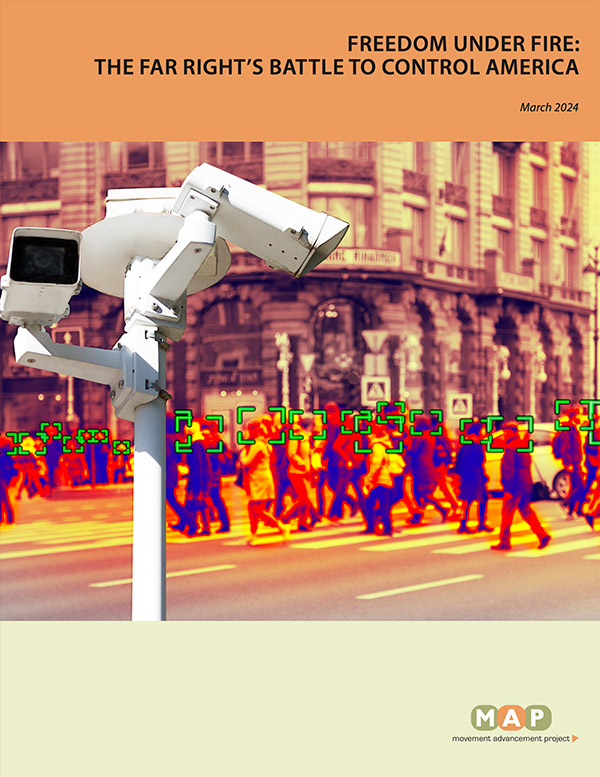"Freedom Under Fire: the Far Right's Battle to Control America"Download Equality Map: Bans on Transgender People’s Use of Bathrooms and FacilitiesView Our map Equality Map: Defining Sex to Allow Discrimination View map Democracy Map: State Legislature Interference in ElectionsView map MAP Series — "Under Fire: the War on LGBTQ People in America"Read more
Across virtually every aspect of life, people’s freedoms are under assault in the United States. The forces attacking these diverse freedoms ultimately want to create a rigid, restrictive society according to their worldview only, with little room for those of different beliefs, values, or expression.MAP's new report, Freedom Under Fire: the Far Right's Battle to Control America, connects the dots on extremist politicians’ attempts to fundamentally remake this country. These attacks affect nearly every aspect of our lives, including the following:
Restrictions on health care and the right to make decisions about one’s body - Lawmakers want to decide what kind of health care people can receive, including limiting the ability to get an abortion, receive medical care as a transgender person, and access preventative care like contraception and PrEP.
Restrictions on the freedom of ideas and the ability to get a comprehensive education - Recently passed laws include censor what schools can teach about a range of important topics such as slavery and the Holocaust, and about the contributions of people of color and LGBTQ people. Similarly, the surge in banning books from public libraries and schools limits the ability to learn about topics the far right disagrees with.
Restrictions on the freedom of travel and the ability to be in public places Restrictions on accurate legal recognition of people’s identities - Attacks include making it harder, if not impossible, for people to obtain ID documents. This puts transgender people, undocumented immigrants, and others at risk and limits their ability to move through daily life.
Restrictions on freedom of the press and freedom of expression - Despite the First Amendment as a core principle, attacks in this area include policies that limit and punish free expression and that infringe on freedoms of the press, speech, and protest. Efforts to force journalists to register with the state, to restrict the right to protest, to ban drag shows, and to remove LGBTQ Pride flags from public spaces speak to the pervasiveness of these efforts.
Restricting the right to vote and participate in free, fair elections - Far-right politicians are attacking the cornerstone of our democracy with a range of restrictions on the right to vote. Targeted efforts disenfranchise younger voters and voters of color and limit people’s ability to elect leaders to represent their values. Further, even elected officials who advocate for their constituents’ freedoms have been censured, trying to silence them.
Recommended citation format:
Movement Advancement Project. March 2024.
Freedom Under Fire: the Far Right's Battle to Control America. https://www.mapresearch.org/2024-freedom-under-fire-report.


